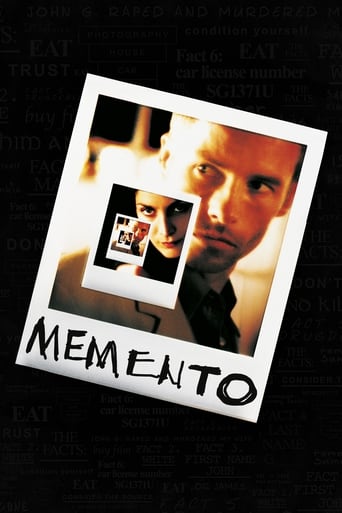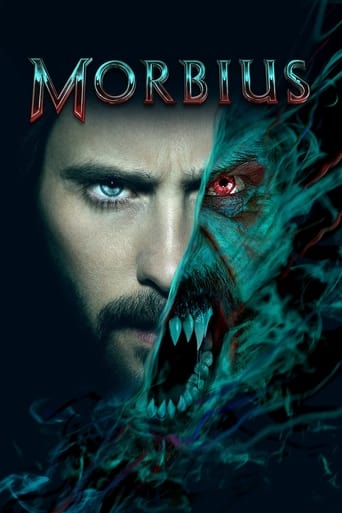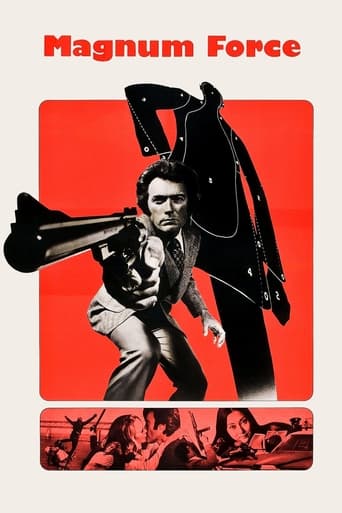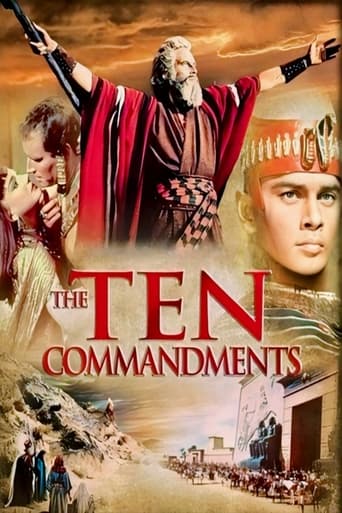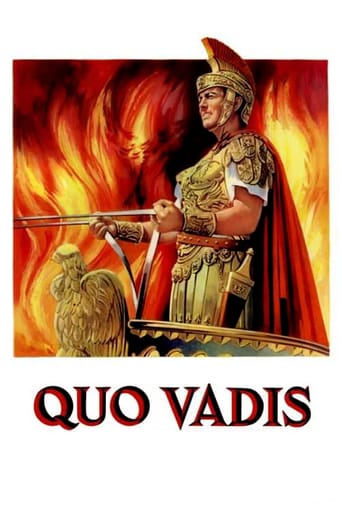


Quo Vadis
After fierce Roman commander Marcus Vinicius becomes infatuated with beautiful Christian hostage Lygia, he begins to question the tyrannical leadership of the despotic emperor Nero.
-
- Cast:
- Robert Taylor , Deborah Kerr , Leo Genn , Peter Ustinov , Patricia Laffan , Finlay Currie , Abraham Sofaer


Similar titles
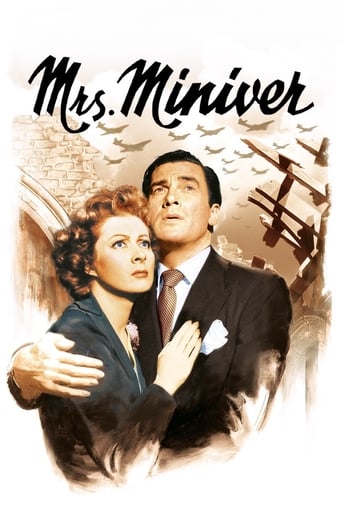
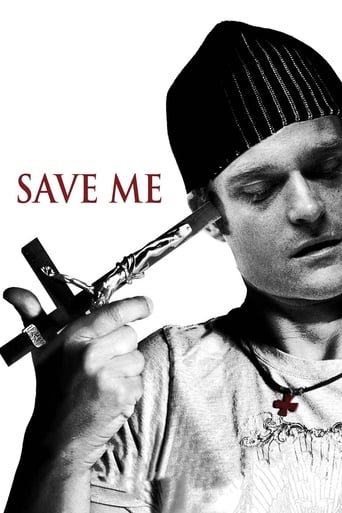


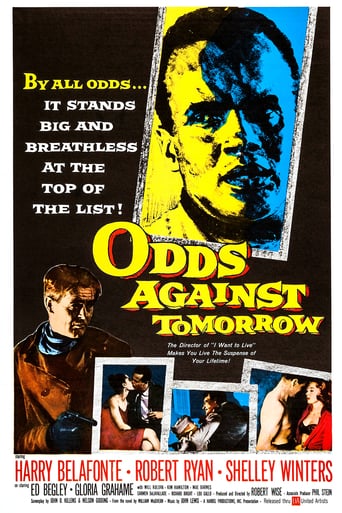
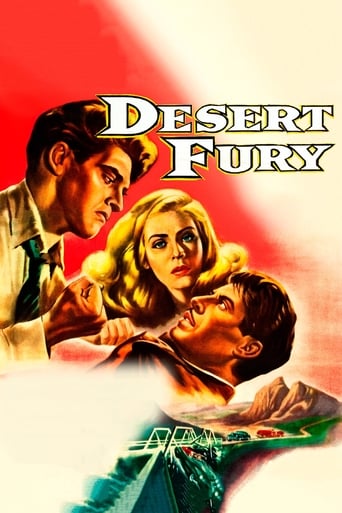


Reviews
Admirable film.
In truth, there is barely enough story here to make a film.
Tells a fascinating and unsettling true story, and does so well, without pretending to have all the answers.
Story: It's very simple but honestly that is fine.
Whither goest thou ? ... is what my translation program came up with. There have been many remakes of this story over the years; this one starring Robert Taylor and Deborah Kerr as Marcus and Lygia. Peter Ustinov, who could play anything is in here as Nero. Roman Marcus falls for christian Lygia. And the un-mistake-able voice of Walter Pidgeon narrating the whole deal. imdb says that both sophia loren and liz taylor are in uncredited roles. Lots of pomp and circumstance, befitting emporer nero. large crowds of ceremonies and extras. Everyone recites their lines almost in monotone, perhaps to symbolize the royal order of the empire, or maybe just because they were all bored with the predictable script. It's very okay. One of the more interesting characters here is "Poppaea", empress to Nero. Agnes Moorehead would have been PERFECT in this evil, scheming role. Nominated for many oscars, but didn't win any. Directed by Mervyn LeRoy. He was nominated for Best Director Random Harvest, but received two honorary awards later on. This is earlier Peter Ustinov, before he got bigger and older. Interesting bit of history, but it's another big hollywood set piece.
Robert Taylor and Deborah Kerr together with Peter Ustinov star in this movie adaption of Henryk Sienkiewicz's classic 1896 novel entitled "Quo Vadis".This tells the story of a love story between an agnostic Roman soldier Marcus Vinicius and a Christian woman Lygia during a time wherein Emperor Nero was into the persecution of Early Christians during the first century. Mervyn LeRoy was the director of the classic epic film released in 1951.No question that Quo Vadis remains a popular film after more than 60 years since it has been released.It provides a great depiction of the persecution and martyrdom of the Early Christians during the time of Emperor Nero.We also witness great acting from the stars particularly Robert Taylor and Deborah Kerr as they provided a great performance of the lead characters Marcus Vinicius and Lygia and most especially Peter Ustinov as cruel and insane Emperor Nero.No wonder that Ustinov won one of the eight Oscars that movie has garnered in 1952 particularly that year's Best Supporting Actor as well as Best Picture. Added to that,a viewer can see that great money has been spent on its production particularly its costumes,production set up and cinematography. It also was shot on location in Rome where the story took place.Finally,it has also great and memorable historic scenes such as the burning of Rome and the crucifixion of Saint Peter upside down.Overall,it is one of the best movies ever released.
Mervyn Le Roy's "Quo Vadis" takes place during the climactic twilight of Nero's despotic reign over the Roman Empire or the dawn of the Christian era marked by the seal of martyrdom, it explores a pivotal point of Occidental history, and indirectly of Hollywood.Following "Samson and Delilah" and preceding "Spartacus", "Cleopatra" and "Ben-Hur", you get indeed two "histories" intertwined in that big juicy blockbuster of former days, a time where the barbarians from the little screen were threatening the foundations of the Hollywood empire, and Zanuck needed the kind of escapism TV wouldn't even be able to deliver, not for five decades. So just assemble the world Technicolor and Cinemascope and you get the idea of the kind of 'fun' movie lovers were seeking those days. And there's no irony in my statement as this trend almost caused the whole industry to collapse by the end of the sixties, where even box-office grosses couldn't sustain the financial losses. Hollywood came too close from a fate à la Roman Empire.So we can enjoy "Quo Vadis" with a sigh of relief, and 'enjoy' is an appropriate word as the colors are absolutely breathtaking and the infamous Rome fire is perhaps the most instantly identifiable after Atlanta in "Gone With the Wind". "Quo Vadis" is also one of these feast to the eyes, with ordinary extras contributing to extraordinary takes, whether legionaries marching, Christians assembling around St Peter, or circus' crowds thumbing up or down,, it's just as if the director needed to show the producers that they made the right investment, the kind of big-budgeted productions that had just recently inspired the Coen brothers' latest film "Hail, Caesar!". So, speaking of Caesar, you got to give him the credit he deserves and acknowledge that the film is a delightful entertainment despite the kitschy charm, the kind that makes you think, they don't make like this anymore.Still, you can have the same opinion with a more negative thought in mind. By that I mean that the catch of this appreciation is that you also consider the fact that we live in a time where they don't make many religious movies, so in regard to this evolution of the mentalities, there is no way out from the feeling that the film tends to be over-preachy for its own good. And actually, I'm trusting the audience from 1951, those who enjoyed risqué movies like "A Place in the Sun" or "A Streetcar Named Desire", I suspect that even by the 50's standards, all these solemn speeches and gaze into the stars, driven by powerful chorus in the background, might have felt too stagy and atmospheric at the expense of the film's realism. It's like a big-scale Christmas special play. Again, no irony; checking the reviews of the time, I wasn't the only one.So that's the flip side of "Quo Vadis", it is a spectacular movie whose spectacular ambitions never leave much latitude to the characters, who are only moving pieces of a big package and are not given much depth to play with. Robert Taylor does a fine job as General Marcus who falls in love with Christian hostage Lygia (Deborah Kerr) but the relationship is Hollywood standard and doesn't have this steaming passion of Clift and Taylor or Brando and Leigh. And while Christians are supposed to be martyrs, they're all played like overly dignified people, using great and lyrical sentences, everything about "sin here, sin there", as if they were part of a brainwashed sect. By sanctifying them, the screenplay dehumanizes them and prevents a rooting process that could have worked better had they been ordinary people. But then, which character was 'ordinary'? I think I shouldn't be too pointy on the characters because "Quo Vadis", for all these flaws, emerges above the other swords-and-sandals epics and guaranteed its ticket for posterity thanks to one character: Emperor Nero, played by the inimitable Peter Ustinov, actually, the only Oscar-nominated performance of the film. There is no doubt that Ustinov lies on a pedestal of greatness over the other actors, playing a tormented, egomaniac and sadistic emperor. Ustinov is so good that he produces a miracle almost of Biblical proportions, while the Christians' sanctification creates empathy on a religious level but not our individual empathy, we root for Nero because Ustinov makes the tyrant childishly and grotesquely weak, hence human. That's one of the film's most delightful ironies.And as much as I admired the looks and the Circus' sequence, it is never as good as when it orbits around the world of Nero and his close entourage, I also appreciate Leo Genn who did a fine performance as Petronius. It is the credit to the actor to have spiced up what would have been an otherwise bland entertainment, all in Technicolor and Cinemascope. Indeed, as the title says, this is one of these cases, maybe school cases, where the film is as good as the villain, and on that level, "Quo Vadis" is almost great.
What a colossal bore. I've just spent the thick end of three hours watching at most - and being generous - three minutes of half-decent cinema. Presumably it was 'sold' as spectacle and if that's true then they really SHOULD have gone to Specsavers. What it is is TALK and then MORE talk and nothing worth hearing. It's just possible with two half-decent leads as opposed to the wooden Taylor and the insipid Kerr it might have been watchable, say Lancaster or Douglas opposite Ava Gardner. As it is the only diversion is looking for the uncredited Liz Taylor and/or Sophia Loren. Ustinov walks away with it of course but given the role as written even Arthur Mullard could have made a respectable stab at it. Finlay Currie and Felix Aylmer in one movie is also notable though not enough to make it watchable. Maybe if they'd turned the lions loose at the first pre-production session it would have done us all a fovour.




